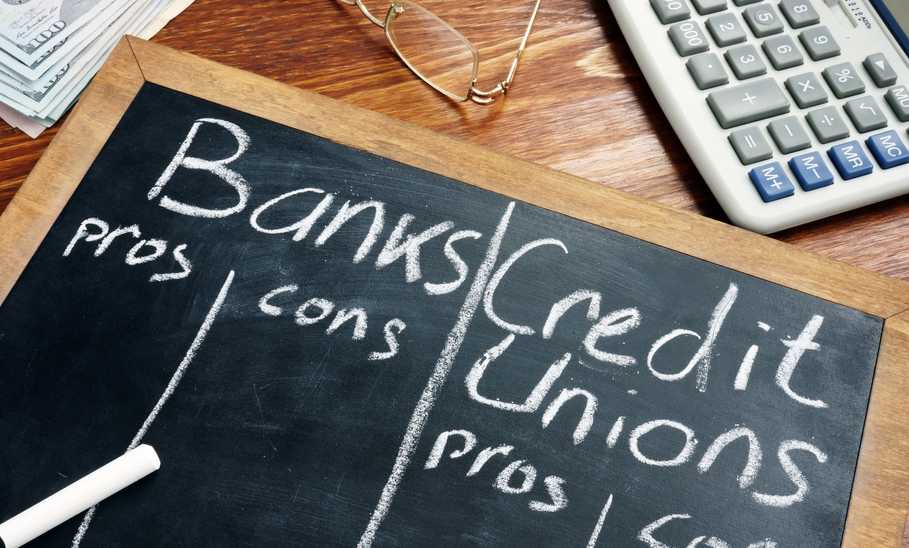Credit Unions vs. Banks: Key Differences and How to Choose the Right One for You

Our evaluations and opinions are not influenced by our advertising relationships, but we may earn a commission from our partners’ links. This content is created by TIME Stamped, under TIME’s direction and produced in accordance with TIME’s editorial guidelines and overseen by TIME’s editorial staff. Learn more about it.
You have a choice of two primary types of financial institutions that offer checking accounts, savings accounts, and other types of savings vehicles: banks and credit unions. Despite these similar offerings, they are not identical.
Here’s a look at how banks and credit unions compare, how each one operates, and what you need to ask to decide which is right for you.
| Banks | Credit Unions | |
|---|---|---|
Target audience | Consumers interested in brick-and-mortar branches, banking flexibility, and many product options | Consumers looking for various products with low fees and higher interest rates on savings |
Type of institution | Privately owned or publicly traded | Owned by members of the credit union |
Profit structure | A for-profit institution | A nonprofit cooperative (profits are disbursed to members) |
Structure | A customer-based institution | A member-based organization |
Ease of opening account | Easy to qualify, open to most (if not all) | Must meet membership eligibility criteria |
Deposits insured by | FDIC | NCUA |
Banks are the most common type of financial institution in the United States, with 71,190 bank branches operating across the country in 2022, compared with 21,748 credit union branches. While banks are more commonplace, there are definitely pros and cons for consumers to consider before choosing between them and credit unions.
Credit unions are member-owned institutions that offer the same consumer products with a member-based, profit-sharing focus. However, they aren’t open to everyone.
So when should you choose a bank over a credit union? The answer is different for everyone, but here are some situations in which a bank may be the better choice for you and your money.
Credit unions may be less ubiquitous, but that doesn’t mean they are never a good idea. Here are some reasons to choose one.
Are you curious as to which banks and credit unions are the most popular in your area? Here’s a look at the common institutions in some of our biggest cities.
Chase Bank is the most popular bank in New York state, with the majority of its branches lying within New York City limits. This isn’t too surprising, as Chase is also the largest bank in the United States, with the most branches. Chase Bank offers a wide portfolio of products to its customers, including checking and savings accounts (both personal and business), CDs, loans, credit cards, and investment portfolios.
Bethpage FCU is the largest credit union in the Empire State. It has 33 total branches throughout the state, though only a handful are located in the NYC area.
While Chase Bank is also the most popular bank in Illinois, BMO Harris is considered the largest bank in the city of Chicago. In fact, BMO Harris is headquartered in Chicago.
In terms of credit unions, Alliant Credit Union easily takes the top spot in Chicago, and in Illinois as a whole.
Not surprisingly, Chase Bank is also the largest bank in California. In Los Angeles specifically, though, the top spot is held by City National Bank, which is headquartered there. It offers personal and business checking and savings, investment products, loans, credit cards, wealth management, and more.
The biggest credit union in Los Angeles is SchoolsFirst FCU, a California-based financial institution with more than 70 branches, most of which are located in Los Angeles and Sacramento.
Banks and credit unions provide slightly different financial services to customers looking for banking, lending, credit, or even investment products. Both types of institutions can meet your financial needs and offer federal insurance for your deposits, and both can be found throughout the country. The one that’s right for you depends on your eligibility, product preferences, and even the type of experience and access you need most.
If you’re an existing credit union member, taking out a new loan can often be completed the same day, sometimes in just minutes. Getting approval depends on the type of loan you’re after, how much you’re hoping to borrow, and when you apply.
The process for closing a bank or credit union account varies based on the financial institution. You typically won’t be able to close your account unless you have a positive or zero balance. If your account is in the negative, you may be asked to raise it to zero before account closure is approved. Closing the account can sometimes be done online, or you may be required to visit a local branch to complete the process.
An international wire transfer is usually debited from your account within hours or minutes, but it may take up to two days to arrive at the recipient’s financial institution, and up to another two days to get to the recipient. This time line depends not only on your financial institution but also on the receiving institution, the receiving country, and even the date on which the transfer was initiated. In most cases international transfers are completed within two to four business days, but there are exceptions.
The information presented here is created by TIME Stamped and overseen by TIME editorial staff. To learn more, see our About Us page.



